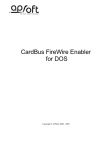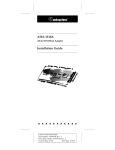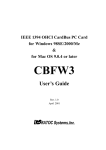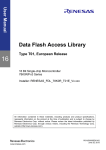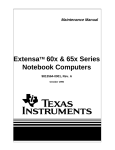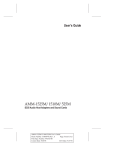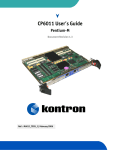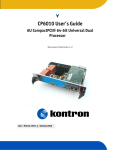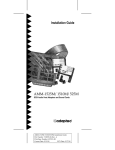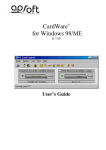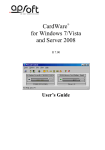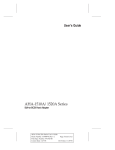Download APA-1460 Enabler for DOS
Transcript
APA-1460 Enabler for DOS Copyright © APSoft, 2003 APSoft Copyright Notice and Disclaimer Unless otherwise noted, this document and the information herein disclosed are proprietary to APSoft. Any person or entity to whom this document is furnished or who otherwise has possession thereof, by acceptance agrees that it will not be copied or reproduced in whole or in part, nor used in any manner except to meet the purposes for which it was delivered. The information in this document is subject to change without notice, and should not be considered as a commitment by APSoft. Although APSoft will make every effort to inform users of substantive errors, APSoft disclaims all liability for any loss or damage resulting from the use of this document or any hardware or software described herein, including without limitation contingent, special, or incidental liability. Copyright © 2003 APSoft. All rights reserved. Issue date 8-Apr-2003. APA-1460 Enabler for DOS CardWare and the APSoft logo are registered trademarks of APSoft. All other products and brand names are trademarks and registered trademarks of their respective companies. APSoft. Sonnenstrasse 26b 85622 Feldkirchen Germany ii Tel: Fax: Internet: +49 (0) 89 900 479 0 +49 (0) 89 900 479 11 http://www.tssc.de APA-1460 Enabler for DOS APSoft Table of Contents Introduction .............................................................................................. v Features and Limitations .......................................................................................................v Enabler Versions .................................................................................................................. vi EN1460 .................................................................................................................. vi CB1460 .................................................................................................................. vi UN1460 ................................................................................................................. vii Installation ................................................................................................ 1 Deployment............................................................................................................................1 Resource limitations ..............................................................................................................2 Memory Requirements...........................................................................................................3 Example of config.sys..............................................................................................3 Special Note for Toshiba Notebooks. ....................................................................................3 Fine-tuning ............................................................................................................................3 Command Line Options. .......................................................................... 6 Common Command Line Options..........................................................................................6 EN1460 and UN1460 Specific Options .................................................................................8 CB1460 and UN1460 Specific Options .................................................................................8 Initialization File ..................................................................................... 11 Socket Sections ...................................................................................................................11 PCI Sections ........................................................................................................................12 MemFilter, PreFilter, MemFilter0, MemFilter1.......................................................12 IoFilter, IoFilter0, IoFilter1 .....................................................................................13 IRQ ........................................................................................................................13 ISAEnable .............................................................................................................13 VGAEnable............................................................................................................13 ExCABase .............................................................................................................13 LegacyBase...........................................................................................................13 PrimaryBus, SecondaryBus, SubordinateBus .......................................................14 CISBase ................................................................................................................14 Additional information ........................................................................... 15 How to get Technical Support for APA-1460 Enabler..........................................................15 Example of INI file................................................................................................................15 APA-1460 Enabler for DOS iii APSoft This page is intentionally blank. iv APA-1460 Enabler for DOS APSoft Introduction This manual provides an overview of the Adaptec SCSI Host Adapter APA-1460 Card Enabler family for DOS. All released versions are collectively named “APA-1460 Enabler” throughout this manual. APA-1460 Enabler is a small, but powerful driver supporting Adaptec APA-1460 SCSI Host Adapter cards and fully compatible with Adaptec ASPI Manager ASPI2DOS.SYS. Due to the small memory footprint of the resident part the enabler is an ideal solution for use in various disk-cloning schemes. Both, Symantec Norton Ghost and Power Quest Disk Copy, are supported. Features and Limitations APA-1460 Enabler supports both, original DOS (e.g. MS-DOS 6.22) as well as DOS included with Windows 95/98. Resident part of APA-1460 Enabler occupies approximately 1 kB of memory or larger, depend from used features. APA-1460 Enabler can be loaded via CONFIG.SYS, AUTOEXEC.BAT, or simply started from DOS command prompt. However for use APA-1460 Enabler with Adaptec ASPI manager ASPI2DOS.SYS you have to load driver in CONFIG.SYS. APA-1460 Enabler can be unloaded, except if it is loaded from CONFIG.SYS. Besides APA-1460 Enabler prevents second load of itself. APA-1460 Enabler may provide support of Adaptec APA-1460 SCSI Host Adapter cards without load Adaptec ASPI Manager ASPI2DOS.SYS. APA-1460 Enabler may provide support of SCSI devices without load driver for your device. APA-1460 Enabler may provide full LBA support for disks of any size. Large disks are supported. APA-1460 Enabler may provide full INT 13h support, including extension. Most utilities (FORMAT.COM, FDISK.EXE, Norton Utilities, etc.) are supported. APA-1460 Enabler for DOS Introduction v APSoft APA-1460 Enabler may support simultaneously up to 8 SCSI Hard Disks per one Adaptec APA-1460 SCSI Host Adapter card. Number of supported partitions is limited only by number of available drive letters. User may freely assign drive letters to partitions, except if APA-1460 Enabler is loaded from CONFIG.SYS. APA-1460 Enabler does not provide hot-swap support. The APA-1460 Card and all SCSI devices should be connected to the computer before APA-1460 Enabler is started. APA-1460 Enabler cannot be loaded in the Windows DOS session. APA-1460 Enabler configures Adaptec SCSI card to I/O address 0x340 with IRQ 9, 10, 11 or 12. No other resource combination is supported by APA-1460 SCSI card. APA-1460 Enabler provides a set of flexible configuration options via command line or external .INI file. Enabler Versions There are three versions of APA-1460 Enabler released: EN1460, CB1460 and UN1460. All three versions share common features and differ only by a set of supported PC Card adapters. EN1460 EN1460 is designed for Intel PCIC compatible PC Card adapters. (E.g., Intel Step A, B and C, Vadem VG-365/465/468/469, Ricoh RF5C266/366/269/369, Cirrus Logic CL-PD6710/6720/6722/6729/6730, Toshiba ToPIC, etc.) EN1460 will also work on most CardBus adapters, but only if the CardBus adapter is properly configured by the Computer BIOS. Most of today’s notebooks BIOS will provide proper CardBus initialization. EN1460 will not work on CardBus adapters that are not initialized by BIOS. CB1460 Compared to EN1460, CB1460 is especially designed to work on CardBus adapters. In case a CardBus adapter is not properly initialized, CB1460 is able to update the CardBus adapter configuration. Most of the required initialization can be done automatically without user intervention. However, if required, user will be able to control most settings, either via command line parameters or, in complicate cases, via external .INI file. vi Introduction APA-1460 Enabler for DOS APSoft UN1460 UN1460 combines the best features of EN1460 and CB1460 in one driver; of course at a price of a slightly larger memory footprint compared to EN1460 and CB1460. UN1460 is recommended for mixed CardBus/PCIC environments and for Toshiba Laptops where the PC Card adapter mode can be set via BIOS Setup (ToPIC 95/97/100 can work either in PCIC compatible or in CardBus mode). APA-1460 Enabler for DOS Introduction vii C H A P T E R 1 Installation The APA-1460 Enabler may be installed either in CONFIG.SYS, AUTOEXEC.BAT or started from DOS command line. It’s possible to relocate enabler into upper memory using DEVICEHIGH or INSTALLHIGH statements in CONFIG.SYS. The APA-1460 Enabler provides several command line switches allowing finetuning of the driver. In more complicate cases you may create an initialization file with very detailed configuration instructions. It is recommended that you fine-tune CardBus Enabler switches starting CardBus Enabler from the command line. After switches are set, you can place call of CardBus Enabler either to CONFIG.SYS or to AUTOEXEC.BAT. Deployment In order to use SCSI devices (such as JAZ drive or CD-ROM) you typically will need to load APA-1460 Enabler, Adaptec ASPI manager ASPI2DOS.SYS and driver for your device. E.g. usage of CD-ROM requires ASPICD.SYS; usage of SCSI Disk – ASPIDISK.SYS, etc. ASPI manager and required drivers could be found in the Adaptec EZ-SCSII package. However APA-1460 Enabler may provide support of Adaptec APA-1460 SCSI Host Adapter cards and SCSI devices without load any additional drivers. For use CD-ROM you will also need to load MSCDEX.EXE in your AUTOEXEC.BAT. If you are trying to use SlimSCSI with IOMEGA JAZ device we recommend that you be using IOMEGA GUEST.EXE application rather then stack of ASPI drivers. It gives more compact image on the floppy. APSoft Resource limitations Adaptec SlimSCSI 1460 card supports very limited set of resources. Card Information Structure (CIS) allows using only I/O address at base 0x140 or 0x340 and IRQ 9, 10, 11 or 12 in ISA mode only (Level). Please also notice that despite the fact that Adaptec documentation claims that I/O range 0x140 is supported, we were never able to use it. The I/O range 0x340 usually works fine. If the I/O addresses is usually available the IRQ could be a problem on some of machines. On today computer the IRQ 12 is never available (used by PS/2 mouse). PCI devices commonly use the IRQ 11. The IRQ 9 or 10 is available on most of the system, but not on all. E.g. BIOS of Toshiba Satellite 1625CDT uses IRQ 9 for USB, IRQ 10 for Rockwell modem and IRQ 11 for ATI Rage VGA. Since SlimSCSI 1460 Card declares that IRQs should be used in ISA mode only (i.e. IRQs are not shareable) Adaptec card will be never configured by CardWare on such PC. The only remedy is to get a BIOS update for such machine. It's very important that IRQ used by APA-1460 Enabler is free and match to the IRQ that you specify in /Q parameter of ASPI2DOS.SYS. You may control which IRQ is used by APA-1460 Enabler using /CI switch. Exact the same IRQ should be specified in /Q parameter of ASPI2DOS.SYS. In rare situations it happens that the above setup is not working. It usually due to one of two reasons: 2 Installation ?? Resource conflict. Please use any computer diagnostic program (e.g. CheckIt) to check if the I/O range of 0x340-0x35F and IRQ 10 (9, 11, 12) are in use by other hardware. If they are and you cannot free them, there is no way to make 1460 work due to extremely limited set of resources supported by that card. ?? Improper setup of CardBus adapter by BIOS. If you are sure that I/O range of 0x340-0x35F on your computer is free and IRQ 10 are not in use, you may have to adjust interrupt mode by adding some switches to APA-1460 Enabler. Please refer to chapter “Command Line Options.” for details. APA-1460 Enabler for DOS APSoft Memory Requirements All versions of APA-1460 Enablers require 4 kB of memory to access the SCSI Card Information Structure (CIS). This memory is required only during initialization. In addition CB1460 and UN1460 require 4 kB of memory per CardBus socket to establish the memory access to CardBus registers. This memory is required only during initialization. The required memory should not be shadowed by BIOS and should be excluded from memory management by EMM386.EXE if you load APA-1460 Enabler after EMM386.EXE. Most computers provide such non-shadowed memory at address 0xD0000, so by default all APA-1460 Enablers will use the address above. However of some machines, the address above may be used by another hardware. In this case, APA-1460 Enabler allows modify used memory address via command line. Example of config.sys You can invoke APA-1460 enabler in the any point. For example: … DEVICE=C:\UN1460.EXE /M:0xD4000 /CI:10 DEVICE=C:\DOS\HIMEM.SYS /TESTMEM:OFF DEVICE=C:\DOS\EMM386.EXE NOEMS X=0xED00-0xEFFF DOS=HIGH,UMB … DEVICEHIGH=C:\ASPI2DOS.SYS /D /PCMCIA /Z /Q10 /P340 … Special Note for Toshiba Notebooks. If you are using EN1460 on Toshiba notebooks please make sure that you set the PC Card adapter either to Auto-Select mode, or to PCIC mode via BIOS setup. The CardBus/PC-Card 16 mode is not supported. When using CB1460 please make sure that you set the PC Card adapter to CardBus/PC-Card 16 mode. The PCIC and Auto-Select modes aren't supported. `The UN1460 works in either mode. Fine-tuning The fine-tuning could be performed either in standard installation mode via command line options, or in advanced installation mode via an external INI file. APA-1460 Enabler for DOS Installation 3 APSoft Following chapters describe both modes in detail. In both modes several optional parameters require a numeric value. Any numeric value could be entered as decimal (default form) or hexadecimal (with 0x prefix) number. For example: /PI:10 and /PI:0x0A both specify IRQ 10. In both modes several optional parameters require <use> values. Use values may typically be specified as ON, OFF or AUTO in upper or lower case. 4 Installation APA-1460 Enabler for DOS APSoft This page is intentionally blank. APA-1460 Enabler for DOS Installation 5 C H A P T E R 2 Command Line Options. Command line options can be specified in any order, either in upper case or in lower case. Typical parameters start with slash (/) or dash (-) followed by one or two letters (e.g. /H or /VR). Some command line options require an additional value. In this case parameters should be followed by colon (:) or equal (=) then value (e.g. /M:0xEC000). Command line options are separated by spaces. Common Command Line Options Following options are common for all versions of APA-1460 Enablers. /H | ? /E Print online help Silent mode: No display output. Resource Management /M:n Start address of memory pool (Default: 0xD0000) /IO:n Start address of I/O pool (Default: 0x340) /CI:n Card Functional Interrupt Line (Default: 0x0A) Diagnostics and Fine-tuning /V[:<file>] Verbose mode: Configuration steps will be outlined on console or to file (if file pathname is specified). /FL Flush log file to disk immediately after each update (may be useful in case of system hang). /ID Displays identified drive information. APSoft /Ln:Letter Specifies the drive letter assigned to SCSI partition 'n', where n could be in range of 0 to 9 (E.g., /L0:M /L1:K /L2:Z.) Drive letters selected by the user can only be taken into account if the APA1460 Enabler is loaded in TSR mode (e.g., from AUTOEXEC.BAT or command line), and will be ignored if the device driver is loaded from CONFIG.SYS. User may assign more than 10 drive letters using the .INI file. /F=filename Specifies the initialization file pathname. By default the initialization file has the same name as the Enabler, but with extension .INI (i.e., EN1460.INI, CB1460.INI and UN1460.INI correspondingly). Enabler will be looking for the .INI file in the same subdirectory where enabler itself is located. Using /F parameter user may override path and name of the default initialization file. (E.g., /F:E:\Settings\en1460.ini) ASPI Management /NA Skip ASPI initialization. In this case Adaptec ASPI manager ASPI2DOS.SYS and driver for your device is required. /I Ignore (do not install) INT 13 interface support for SCSI hard disk devices. Also no drive letter will be created. In this case driver for your device is required. /IC Ignore (do not install) support for SCSI CD-ROM disk devices. In this case driver for your device is required. /D:devname Specifies device name of CD-ROM driver (Default: ASPICD01) Can be used by MSCDEX.EXE to support SCSI CD-ROM disk devices. /L /RS:<use> APA-1460 Enabler for DOS Support LUNs 0-7 (otherwise supports only LUN 0). Reset SCSI bus during ASPI initialization. Command Line Options. 7 APSoft /HI:n Specifies the Host Adapter SCSI ID (0 - 7). /DI:<use> Allow SCSI targets to disconnect during command execution. /SN:<use> Enable the Host Adapter to initiate negotiation with the target for synchronous data transfer. /PA:<use> Enable SCSI bus parity check by the Host Adapter. Unloading /UL Unload resident part (not supported, if driver is loaded via config.sys) EN1460 and UN1460 Specific Options Following command line options are for EN1460 and UN1460 only. Using them the user may override the default base address of the PC Card adapter or override the default socket number. In case of UN1460: Parameters only apply to non-CardBus sockets. /B:n PCMCIA adapter base I/O address (Default: 0x03E0) /S:n PCMCIA socket number (Default: 0) Please notice, that if you want to support more than one non-CardBus socket using EN1460 or UN1460, you will have to create an INI file. CB1460 and UN1460 Specific Options Following command line options are for CB1460 and UN1460 only. Using them the user may control the initialization of CardBus sockets. On most of recently made notebooks the BIOS will configure the interrupt mode properly. You should not specify /PI, /MI, /MX and /OZ options unless you are sure that the interrupt mode is not set properly. /PI:n 8 Command Line Options. PCI Interrupt level (Default: 0x0B) APA-1460 Enabler for DOS APSoft /FI Force updating of PCI IRQ routing table for socket (even if selected IRQ is already in table. /BS Performs PCI bus scan and termination. Information will be displayed on console /EC:<use> ON OFF Use external power switch clock for adapter. Use power switch clock generated by PCI clock Note: This switch is ignored for all PC Card adapters except Texas Instruments PCI121x/122x and TI PCI125x/14xx/44xx families. /IM:m /MX:<use> Set interrupt mode. Possible values are: Par TI1130/1x31: TI12xx/14xx/44xx: CL-6832, OZ6832: Ricoh RB5C478: use parallel ISA-type interrupts use parallel ISA and PCI interrupts use External-Hardware Interrupt mode use parallel interrupt mode Ser TI1130/1x31: TI12xx/14xx/44xx: CL-6832, OZ6832: Ricoh RB5C478: use serialized interrupt type scheme use serialized ISA and PCI interrupts use PC/PCI Serial Interrupt protocol use serialized interrupt mode PPci TI 12xx/14xx/44xx, Cl-6832, OZ6832: use parallel PCI interrupts only ISPP TI 12xx/14xx/44xx only: use serialized ISA and parallel PCI interrupts. Will be ignored for all other adapters. Pway CL-6832, OZ6832: use PCI/Way Interrupt Signaling mode. Will be ignored for all other adapters Initialize the multiplex IRQ routing register. This switch is only used on TI PCI122x/125x/14xx/44xx adapters and is ignored for all other adapters. /OZ:97:<use> O2Micro PC Card adapter only: set/reset PC97 IRQ bit /OZ:IL:<use> O2Micro PC Card adapter only: set/reset ISA Legacy bit APA-1460 Enabler for DOS Command Line Options. 9 APSoft This page is intentionally blank. 10 Command Line Options. APA-1460 Enabler for DOS C H A P T E R 3 Initialization File The initialization file is a text file that contains special settings. These settings allow you to configure computer hardware components so your CardBus adapters and/or APA-1460 card become functional. Any text in the .INI file starting after the semicolon (;) to end of the line, is interpreted as a comment. Using the INI file you may set both, system-wide and per-socket parameters in any combination. There are two types of sections defined: Socket and PCI. Socket Sections Socket Sections is interpreted only by EN1460 and UN1460 and can only be used for non-CardBus sockets. Both enablers support up to 8 non-CardBus sockets. The socket configuration of such sockets should be described in sections [Socket0] to [Socket7]. Following values are defined for Socket Sections: ‘LegacyBase’, ‘Socket’, ‘CISBase’. Parameters in Socket Sections represent an alternative for command line options /B, /S, /M correspondingly. Parameters specified in Socket Sections override parameters specified in Common Section and Command Line. Using them you may control initialization order and execution mode. For example, you may enable LBA mode by default, but disable it for selected socket. Example: [Socket0] LegacyBase = 0x3E2 Socket = 1 CISBase = 0xEC000 APSoft [Socket1] LegacyBase = 0x3E0 Socket = 0 Please note, that [Socket1] definition omits CISBase setting. In this case settings from command line will be used. PCI Sections PCI Sections is interpreted only by CB1460 and UN1460 and can only be used for CardBus sockets and PCI-2-PCI bridges. Both enablers support any number of CardBus sockets. All section names are relative to original PCI subsystem configuration. You can see that configuration if you switch program to verbose mode. (/V key) or use the /BS switch. In order to specify the required configuration of the PCI device, you need to know the location of the device. This location is specified in Bus:Device:Function form. Location 0:A:1 describes the first function of PCI device number 10 (“A” in hexadecimal format) located on PCI bus 0. Initialization file section used for the configuration of such a device should have the name [0:A:1]. Value names depend on device type. For CardBus adapters, following values are defined: 'IoFilter0', 'IoFilter1', 'MemFilter0', 'MemFilter1', ‘ExCABase', 'LegacyBase', ‘IRQ’, ‘ISAEnable’, ‘VGAEnable’, ‘CISBase’. For PCI-to-PCI bridges, following values are defined: 'IoFilter', 'MemFilter', 'PreFilter', ‘IRQ’, ‘ISAEnable’, ‘VGAEnable’. MemFilter, PreFilter, MemFilter0, MemFilter1 These parameters define the CardBus or PCI-to-PCI bridge memory filter base and limit (or size) both memory filters (prefetcheable and non-prefetcheable). The CardBus base and size values should have 4K alignments according to Yenta specification and limit (maximum address) should be aligned to 4K minus one. Following formats could be used to specify bridge memory filter ranges: BaseAddress:Limit. This means that we define the first and exactly the last integer number in a range (e.g., 0xA0000000:0xA0000FFF specifies 4K ranges). If you wish to disable positive decoding of PCI-to-PCI bridge's filter range, please specify something like: 200000:1fffff. 12 Initialization File APA-1460 Enabler for DOS APSoft If you prefer to specify filter size rather than filter max address you should use BaseAddress,Size format, where Size by default is a literal decimal number. In this case you also could use 'M' or 'K' postfixes (e.g., 0xA0000000,1M specifies 1M memory filter starting at 0xA0000000 address). Attention! All values are treated as hexadecimal even if there is no “0x” prefix. Examples: MemFilter0=A0000000h:A0000fffh MemFilter0=A0000000h,4K MemFilter0=A1000000h:A1001fffh,Pre MemFilter0=A1000000h,8K,Pre IoFilter, IoFilter0, IoFilter1 Examples: 16-bytes I/O range CardBus interrupt line settings. According to PC/AT architecture this value must not exceed 15. IRQ = 10 ISAEnable memory range memory range pref. memory pref. memory This is the bridge I/O range base and limit (or size). For CardBus base and size values must have double-word alignment. IoFilter = 0xD000:0xD00F IRQ 4K 4K 8K 8K 10th interrupt Control setting of ISA Enable bit in Bridge Control Register. Valid values are 0 and 1. Example: ISAEnabe = 1 VGAEnable Set ISA Enable bit Control setting of VGA Enable bit in Bridge Control Register. Valid values are 0 and 1. Example: VGAEnabe = 0 ExCABase Reset VGAEnabl bit This option is used to mountain CardBus socket register/ExCA registers base address register. Available values: any 32-bit hexadecimal number aligned to 4K boundaries. Example: ExCABase = D8000000h LegacyBase APA-1460 Enabler for DOS This is PC Card 16-Bit IF legacy mode base address. Available values: any 16bit hexadecimal number aligned to double-word boundary. Initialization File 13 APSoft Example: LegacyBase = 3e0h PrimaryBus, SecondaryBus, SubordinateBus These options control bus number assignments for PCI-to-PCI and CardBus bridges. Available values: any decimal number not greater than 255. Example: [0:A:0] PrimaryBus SecondaryBus SubordinateBus TI PCI1131 socket = 0 = 1 = 3 Set sec. bus to 1 Set sub. bus to 3 ; Now socket 0 of TI PCI1131 CardBus adapter accepts ; I/O requests to buses from 1 to 3 inclusive [0:A:1] PrimaryBus SecondaryBus SubordinateBus CISBase TI PCI1131 socket = 0 = 4 = 4 Set sec. bus to 4 Set sub. bus to 4 Card entry ‘CISBase’ defines location of CIS access window. Example: [0:A:1] CISBase = 0xEC000 14 Initialization File Card in Socket 1 APA-1460 Enabler for DOS A P P E N D I X Additional information How to get Technical Support for APA-1460 Enabler Please send an E-mail in English (we can’t process technical support questions in any other language) to technical support ([email protected]). In your request please specify: 1. Description of your problem. 2. The card name exactly as it appears on the card. Please attach to your e-mail following files: 1. Please run APA-1460 Enabler with /V[:<file>] switch (plus all parameters you normally use), capture the output to the file and attach it to your e-mail. E.g. C:\>UN1460 /M:0xC8000 /V:LOG.TXT or DEVICE = UN1460.EXE /M:0xC8000 /V:LOG.TXT 2. CONFIG.SYS 3. AUTOEXEC.BAT 4. Enabler initialization file if one exists. Example of INI file Following sample shows an example of UN1460 initialization file for the system with one CardBus and one PCIC compatible adapter ;;;;;;;;;;;;;;;;;;;;;;;;;;;;;;;;;;;;;;;;;;;;;;;;;;;;;;;;;;;;;;;;;;;;;;; ;; UN1460 Enabler. Sample of Initialization file ;;;;;;;;;;;;;;;;;;;;;;;;;;;;;;;;;;;;;;;;;;;;;;;;;;;;;;;;;;;;;;;;;;;;;;; ; PCI-2-PCI Bridge between bus 0 and bus2 [0:1E:0] PreFilter=0x60000000:0x60FFFFFF ; CardBus socket 0 [2:B:0] ExCABase=0xD2000 CISBase=0xD3000 ; Set ExCA address to 0xD2000 CUSTOMER LICENSE AGREEMENT APSoft thanks you for selecting one of their products for your computer. This is the APSoft Customer License Agreement which describes APSoft's license terms. - PLEASE READ THIS NOTICE CAREFULLY DO NOT DOWNLOAD OR USE THE SOFTWARE UNTIL YOU HAVE READ THE LICENSE AGREEMENT. BY ACCEPTING TO DOWNLOAD THIS SOFTWARE, APSOFT WILL ASSUME THAT YOU HAVE AGREED TO BE BOUND BY THIS STANDARD AGREEMENT. IF YOU DO NOT ACCEPT THE TERMS OF THIS LICENSE, YOU MUST RETURN THE PACKAGE UNUSED AND UNOPENED TO THE PARTY FROM WHOM YOU RECEIVED IT. Grant of License. APSoft grants to you and you accept a license to use the programs and related materials ("Software") delivered with this License Agreement. This software is licensed for use on one computer at a time. You may run this software on as many machines as you like provided there is no possibility that it can be run on more than one machine at a time. The software should never be installed on the hard drive of more than one computer. If the software is installed on a network hard drive, access must be restricted to a single user. You agree that you will not transfer or sublicense these rights. If you use the Software on more than one computer at a time, you must license additional copies or request a multi-user license from APSoft. Term. This License Agreement is effective from the day you receive the Software, and continues until you return the original magnetic media and all copies of the Software to APSoft. APSoft shall have the right to terminate this license if you violate any of its provisions. APSoft or its licensors own all rights, title, and interest including all worldwide copyrights, in the Software and all copies of the Software. Your Agreement. You agree not to transfer the Software in any form to any party without the prior written consent of APSoft. You further agree not to copy the Software in whole or in part, except for backup copies, unless APSoft consents in writing. Each of these copies must have a label placed on the magnetic media showing the program name, copyright, and trademark designation in the same form as the original Software. You will use your best efforts and take all reasonable steps to protect the Software from unauthorized reproduction, publication, disclosure, or distribution, and you agree not to disassemble, decompile, reverse engineer, or transmit the Software in any form or by any means. You understand that the unauthorized reproduction of the Software and/or transfer of any copy may be a serious crime, as well as subjecting you to damages and attorney fees. Disclaimer. APSOFT MAKES NO WARRANTIES, EITHER EXPRESS OR IMPLIED, INCLUDING THE IMPLIED WARRANTIES OF FITNESS FOR A PARTICULAR PURPOSE OR MERCHANTABILITY, AND APSOFT SHALL NOT BE LIABLE FOR TORT, INDIRECT, SPECIAL OR CONSEQUENTIAL DAMAGES SUCH AS LOSS OF PROFITS OR LOSS OF GOODWILL FROM THE USE OR INABILITY TO USE THE SOFTWARE FOR ANY PURPOSE. SOME STATES MAY NOT ALLOW THIS DISCLAIMER SO THIS LANGUAGE MAY NOT APPLY TO YOU. IN SUCH CASE, OUR LIABILITY SHALL BE LIMITED TO THE REFUND OF THE APSOFT LIST PRICE. Updates. APSoft will do its best to notify you of subsequent updates released to the public or major corrections and the price for which they may be obtained. All updates and corrections which are provided to you shall become part of the Software and be governed by the terms of this license agreement. Miscellaneous. This is the only agreement between you and APSoft and it cannot and shall not be modified by purchase orders, advertising or other representations of anyone, unless a written amendment has been signed by one of our company officers.

























